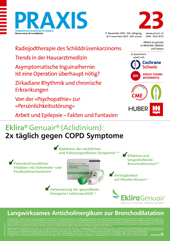Von der «Psychopathie» zur «Persönlichkeitsstörung» – die begriffliche Entwicklung eines heiklen psychiatrischen Bereiches
Abstract
Zusammenfassung. Das Thema «Persönlichkeitsstörungen» berührt viele grundsätzliche Fragen der Psychiatrie: Gibt es eine klare Grenze zwischen normalem und krankhaftem Verhalten? Nach welchen Kriterien wird sie festgelegt? Handelt es sich bei Persönlichkeitsstörungen wirklich um psychische Krankheiten oder nicht doch «nur» um Variationen menschlicher (Er-)Lebensstile? Der Beitrag zeichnet die Entwicklung des Begriffsfeldes Psychopathie/Persönlichkeitsstörung vom frühen 19. Jahrhundert bis zur heutigen Diagnostik nach ICD-10 und DSM-5 nach. Die Debatte bewegt sich dabei – wie bei jeder psychischen Störung – zwischen den Polen psychopathologischer, neurobiologischer und sozialwissenschaftlicher Ansätze. Praktisch bedeutsam ist, dass heute wirksame Therapieoptionen zur Verfügung stehen, dass also der früher verbreitete therapeutische Nihilismus in Bezug auf Menschen mit Persönlichkeitsstörungen fehl am Platz ist.
Abstract. The issue of personality disorders addresses fundamental questions of psychiatry: Is there a clear boundary between normal behaviour and the state of mental illness? Which criteria are defining this boundary? Is a personality disorder really a mental illness or «just» a special variation of an individual lifestyle? This paper reviews the development of the terms psychopathy/personality disorder from the early 19th century to the present-day diagnostic manuals ICD-10 and DSM-5. This debate spreads out – as it does with regard to any other mental disorder – between psychopathological, neurobiological and social sciences approaches. It is of high practical relevance to realize that nowadays effective therapeutic options for patients with personality disorders are available. Therefore, the therapeutic nihilism of earlier times is no longer justified.
Résumé. Le problème des désordres de la personnalité pose des questions de psychiatrie fondamentales: Y a-t-il une démarcation claire entre le comportement normal et l’état de maladie mentale? Quels sont les critères définissant cette démarcation? Un désordre de la personnalité représente-il réellement une affection mentale ou simplement une variation spéciale d’un style de vie individuel? Ce papier revoit l’évolution des termes psychopathie et troubles de la personnalité depuis le début du 19ème siècle jusqu’à leur définition actuelle dans les manuels de diagnostics ICD-10 et ICD-5. Ce débat concerne, comme il le fait pour n’importe quel autre trouble mental, des approches psychopathologiques et neurobiologiques, de même que des approches impliquant les sciences sociales. Il est important de réaliser d’un point de vue pratique qu’existent aujourd’hui des options thérapeutiques efficaces pour soigner les malades souffrant de troubles de la personnalité. Ainsi le nihilisme thérapeutique prévalant autrefois n’est plus justifié.



